Institut Français du Tchad, Knock On Art
Tema:Cosa viene prima?
Conductor:Simon Njami, Moïse Touré
Issaka Moussa Bachar, editore del catalogo AtWork.
AtWork N’Djamena Chapter 22 è stato realizzato dalla Fondazione Moleskine in collaborazione con Knock On Art e l’Istituto francese del Ciad. È stata la quarta e ultima tappa del tour AtWork “What Comes First?”, che si è svolto anche a Milano, Parigi e Johannesburg.
Simon Njami su questo tema:
In un dibattito in corso tra Jean-Paul Sartre e Albert Camus su scelte e responsabilità, quando gli è stato chiesto quale sarebbe stata la sua scelta tra sua madre e il suo paese, Camus ha risposto senza alcuna esitazione, mia madre. Ovviamente Sartre, che ha posto l’idea e la causa sopra ogni cosa, non era d’accordo. Ci confrontiamo ogni giorno con scelte critiche che ci costringono a prendere una posizione o intraprendere un’azione. Il modo in cui decidiamo ciò che viene prima non è mai prefissato, come per Sartre e Camus. Ci sono momenti in cui potremmo fare scelte diverse e scegliere priorità diverse, a seconda della situazione. Ma la realtà è che è una domanda a cui non saremo mai in grado di rispondere con piena soddisfazione. È come cercare di rispondere alla domanda impossibile: cosa è venuto prima, tra l’uovo e la gallina. Aristotele cercò di avventurarsi in una soluzione: “il dominio del divenire si contrappone a quello dell’essenza, perché ciò che è posteriore nell’ordine generazionale è, per natura, anteriore e ciò che viene per primo dalla natura è ultimo nell’ordine generazionale”.
Ma siamo tutti liberi di dissentire.
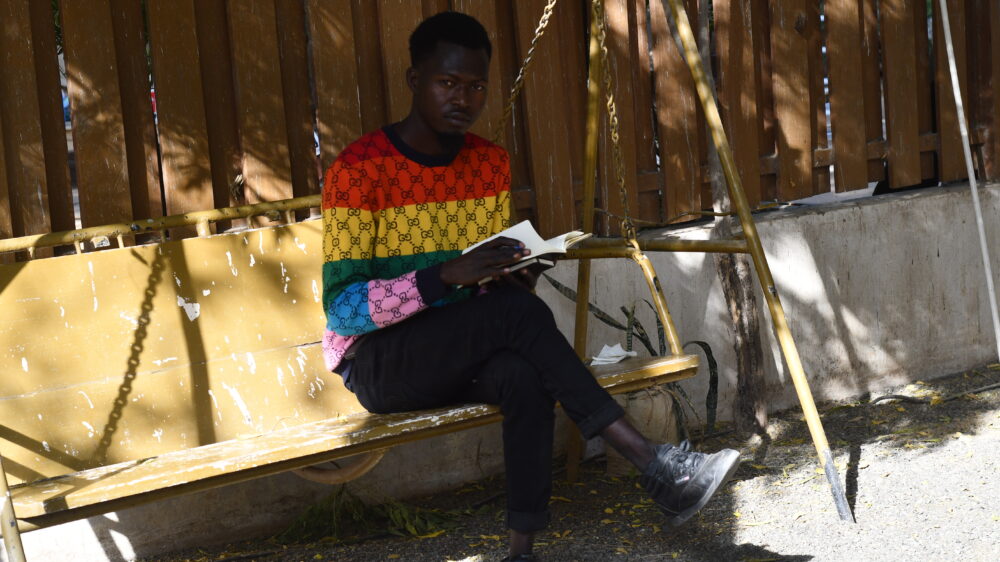
Il workshop si è svolto a N’Djamena, in Ciad, dal 20 al 24 febbraio 2023, ed è stato condotto da Moïse Touré e Simon Njami a Villa Cocac. 22 giovani menti creative provenienti da contesti diversi, tra cui architetti, musicisti, designer, imprenditori, attori e molti altri, sono stati incoraggiati a liberare il loro potenziale creativo attraverso il pensiero critico, sviluppando la consapevolezza di sé e la fiducia in sé stessi e stimolando la loro attitudine a generare il cambiamento. Il risultato creativo di queste riflessioni è stato espresso su un taccuino realizzato da ogni partecipante.
Issaka Moussa Bachar, editore del catalogo AtWork
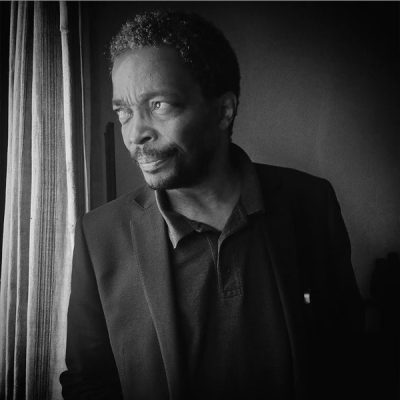
Simon Njami is a Paris-based independent curator, lecturer, writer, and art critic. Njami was the co-founder and editor-in-chief of “Revue Noire“ a journal of contemporary African and extra-occidental art. He has served as artistic director of the Bamako photography biennale for ten years. He co-curated the first African pavilion at the 52nd Venice Biennale in 2007 and curated the first African Art Fair, held in Johannesburg in 2008. He has served for ten years (2000/2010) as a cultural advisor for the AFAA the cultural branch of the French Ministry of Foreign Affairs (today Institut Français) in their cultural cooperation policy. He was a member of numerous art and photography juries (10 years at Worldpress). Njami has curated numerous exhibitions of contemporary art and photography, including Africa Remix (2004-2007) and The Divine Comedy (Frankfurt, Savanna, Washington DC, 2014/15) African Metropolis (MAXXI, Rome, 2018), and two Editions of the Dak’Art Biennale (2016/2018). He was a member of the scientific boards of numerous museums and a Visiting Professor at UCSD (University of San Diego California). He has directed the Pan African master classes in photography (2008/2019), a project that he conceived with the Goethe Institut and he is the advisor of the AtWork educational format that he co-created with Moleskine Foundation in 2012 and continues to conduct until the present moment. He is also currently setting up the permanent collection of contemporary art for the Memorial Acte Museum in Guadeloupe.
Njami has published seven books, including essays and novels.
 Independent and creative, Moïse Touré created the company Les Inachevés in Grenoble. He continues his career in France and abroad. He participated in the implementation, at the Théâtre National de l’Odéon, of the project of Georges Lavaudant with whom he continues an artistic collaboration. He was an associate artist at the Scène Nationale de Guadeloupe, where he laid the foundations for a traveling dramatic repertoire in the Creole language. He was also an associate artist at Bonlieu Scène Nationale d’Annecy, where he implemented “Art and population” projects.
Independent and creative, Moïse Touré created the company Les Inachevés in Grenoble. He continues his career in France and abroad. He participated in the implementation, at the Théâtre National de l’Odéon, of the project of Georges Lavaudant with whom he continues an artistic collaboration. He was an associate artist at the Scène Nationale de Guadeloupe, where he laid the foundations for a traveling dramatic repertoire in the Creole language. He was also an associate artist at Bonlieu Scène Nationale d’Annecy, where he implemented “Art and population” projects.
Traveler, he multiplies artistic collaborations. He sets a common thread: to link the very forms of his work to circumstances and local reactions. It stops in Morocco, Japan, Niger, Bolivia, Mali, Brazil, Senegal, Portugal, and Greece. By bringing in his luggage texts by Marguerite Duras, Jean-Paul Sartre, Bernard-Marie Koltès, Jean-Marie Gustave Le Clézio, and Jean Racine he works a lot as a screenwriter. He was a member of the national mission “Cultural action for republican integration” and in this context, he created and performed on national territory and internationally Claude-Henri Buffard’s play La Minute de Silence. He created and broadcast from 2006 to 2008 in France and Africa 2147, Africa with choreographies by Jean-Claude Gallotta and Seydou Boro, and original music by Rokia Traoré. He takes up the subject of this show 10 years later the creation of 2147, what if Africa were to disappear? In 2011, a new perspective opened up for Moïse Touré’s artistic adventure with the creation of the Academy of Shared Artistic Knowledge and Practices (intergenerational) with the first founding act, the implementation of the Trilogy project for a dialogue of the continents: Europe (France) / Africa (Burkina Faso) / Asia (Vietnam) – Duras, our contemporary through the writings of the author. In 2020, he questions the notion of hospitality with the founding act of the creation of La nuit sera calme, with texts by Jacques Derrida and Anne Dufourmantelle as starting materials. This theme will guide the work of the company Les Inachevés until 2023.
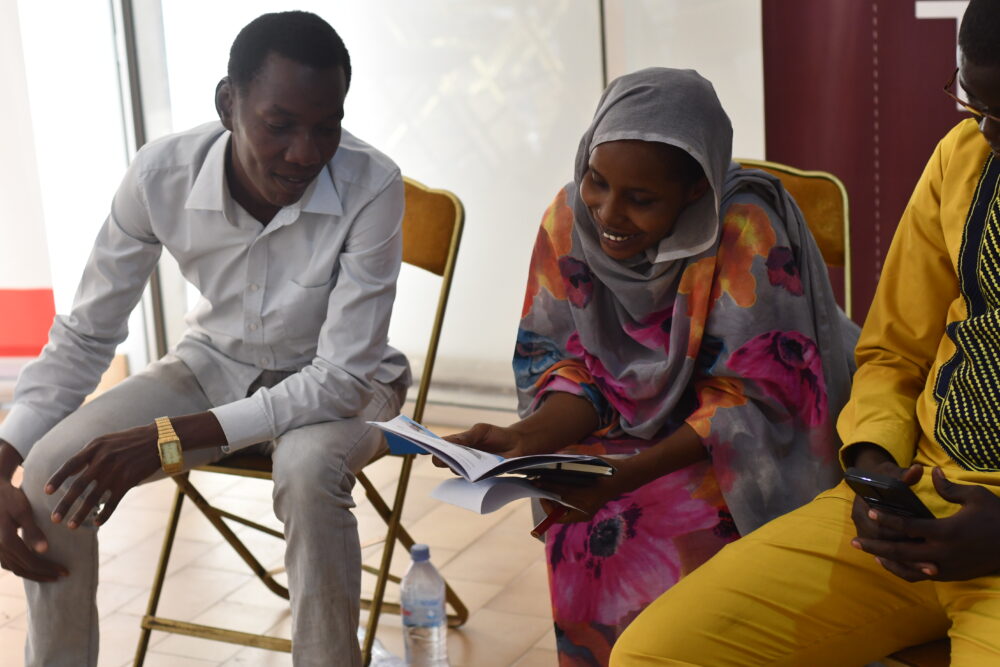
È stata la nostra seconda volta a N’Djamena. Avevamo cercato di ospitare il workshop lo scorso ottobre, ma abbiamo dovuto rimandarlo a causa dei disordini civili causati dalle tensioni politiche nel Paese. I partecipanti hanno iniziato il workshop con menti e cuori aperti, pronti a scavare in profondità per capire “cosa viene prima” per loro come animali sociali. All’inizio è stato sorprendente constatare la loro apertura, dato il contesto culturale in cui ci siamo trovati.
Tuttavia, attraverso la discussione ci siamo rapidamente resi conto che i gruppi dei giovani in Ciad sono costituiti da individui che si dedicano al benessere delle loro comunità e al progresso del loro Paese nel suo complesso Questa atmosfera condivisa ha unito il gruppo in un breve lasso di tempo. Abbiamo avuto l’opportunità di beneficiare di un workshop di successo grazie ai loro valori come singoli individui e i loro atteggiamenti orientati verso la comunità.
Oltre al workshop, questi partecipanti hanno potuto assistere e beneficiare di altre esperienze culturali, come la conferenza stampa di Simon Njami all’Istituto Francese, dove ha fornito spunti personali sulla sua interpretazione del tema del workshop.
Ahmat Aboulaye Malick, curatore del catalogo AtWork.
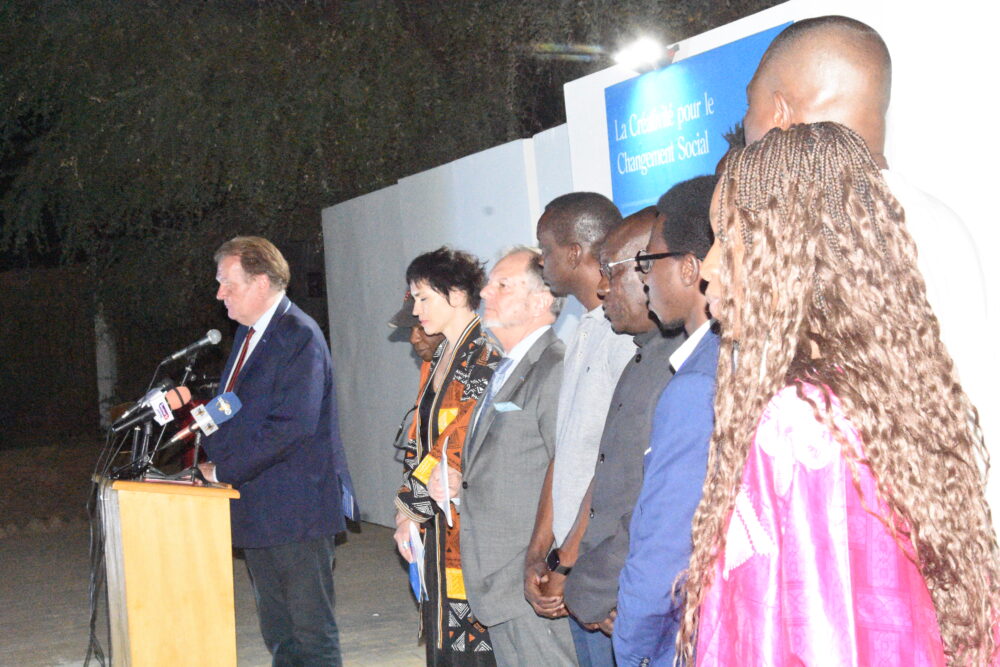
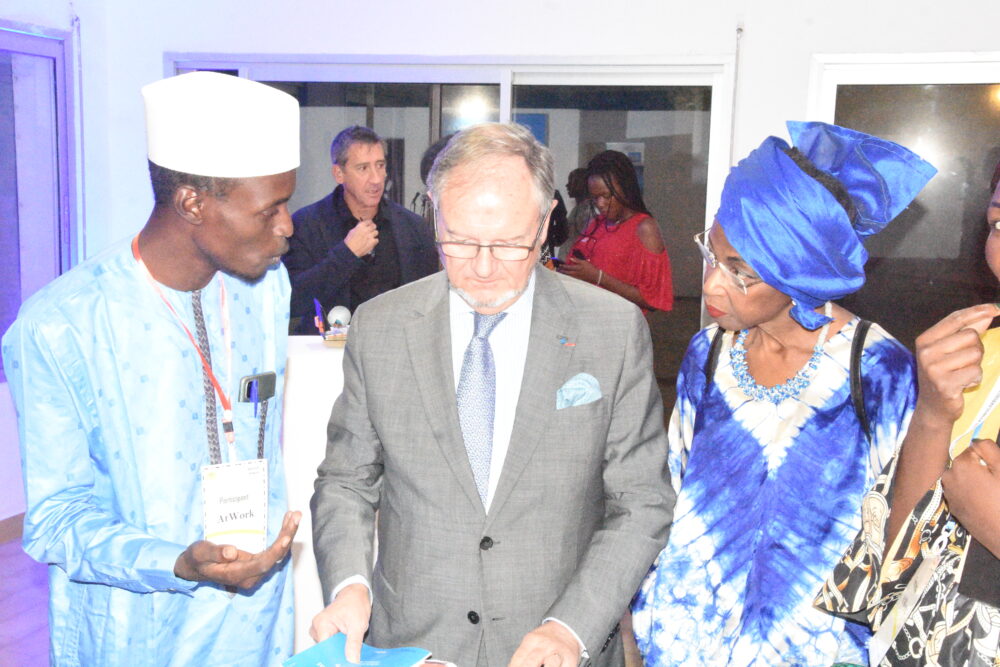
I taccuini Moleskine creati dai partecipanti al workshop sono stati esposti a Villa Cocac. La mostra è stata organizzata dai partecipanti al workshop sotto la supervisione di Simon Njami e Moise Touré. È stata inaugurata il 27 febbraio e rimarrà aperta fino a marzo. Un catalogo speciale con l’interpretazione del tema “What comes first?” e i taccuini di tutti i partecipanti sono stati creati in 48 ore.